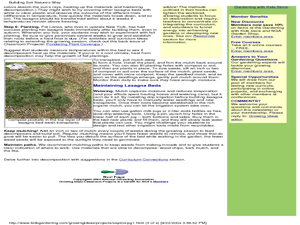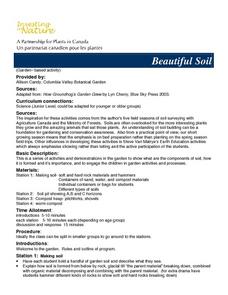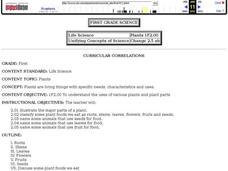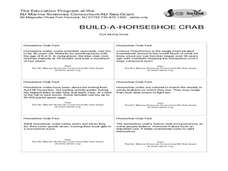Curated OER
Pond Ecosystem Field Trip
Students investigate the environment by participating in a class trip. In this pond ecosystem lesson, students define a list of vocabulary terms associated with ponds such as invertebrate and metamorphosis. Students attend a field trip...
Curated OER
Investigation 3 - Terrariums / Aquariums
Third graders create aquariums or terrariums to explain how creatures depend on living and nonliving things.
Curated OER
What Is Natural?
Your junior highers will learn about which objects are natural and classify objects as abiotic or biotic. Your class will trace human products to their natural resources using matter cycles and then create their own definition of nature.
International Technology Education Association
Pixel This!
Did the image I drew match the image you saw? By simulating a satellite and a ground station, teams of two transmit data in the form of pixels in order to recreate an image. They use four different levels of brightness, creating slightly...
Curated OER
Animal Habitats
Elementary schoolers complete a worksheet that has them decide which of four environments a variety of animals live in. The environments are: pond, soil, ocean, and woodland. There are 12 different types of animals that pupils must match...
Curated OER
Figurative Language Quiz
Combining questions about figurative language and Sandra Cisneros's The House on Mango Street, this quiz would be a good addition to your class. The majority contains questions about simile, metaphor, and personification, from...
Curated OER
Building Soil Nature's Way: Exploring decomposition and soil health
Young scholars explore decomposition and soil health by creating their own garden. For this agriculture lesson, students build a "lasagna garden" with organic matter found in the area and plant perennials native to their region....
American Museum of Natural History
Life in the City
Believe it or not, biodiversity exists even in areas of disturbed habitat. An interactive activity challenges learners to look for species with a magnifying lens in an image of a city habitat. Pop-up images and descriptions explain how...
Curated OER
Earthworm Dissection
Students identify the external features of the earthworm. They view a video about different features of an earthworm. They research information about annelids on the Internet. They compare and contrast the earthworm with another annelid.
Curated OER
Life on the Ocean Floor
Why would water 2700 meters deep suddenly become warmer? Explore this and other ocean floor discoveries through this reading response worksheet. Scholars read information about the organisms discovered by Alvin, a deep-sea submersible....
Curated OER
Compost in a Bag!
Fourth graders experiment to see which objects decompose. In this compost activity, 4th graders observe the changes of labeled objects in a bag. Leave the objects for one month and record the changes by observation and weight. Students...
Curated OER
Soil Composition
Young scholars examine soil. In this soil composition lesson students participate in soil sedimentation and filtration activities. The young scholars discuss what non-living and living things are in soil and why it is so important.
Curated OER
Prairie Food Chains & Webs
Students complete a food chain. In this ecosystem lesson, students learn about producers, consumers and decomposers. Students identify herbivores, carnivores and omnivores and complete two worksheets.
Curated OER
Beautiful Soil
Students discover what are the components of soil. They examine how it is formed and it's importance. They engage in garden activities and processes. They hold a handful of garden soil and describe what they see. They take a...
Curated OER
Classroom Composting
Students observe and describe the cyclic nature of life. They identify and appreciate the importance of a balanced ecosystem. Finally, students compare and contrast biodegradable and non-biodegradable resources in nature and describe the...
Curated OER
COMPARE SOILS BY GROWING PLANTS
The student will identify the difference in the rate of plant growth in three soils that vary in organic matter.1. Obtain three to four flowerpots, different types of soil, a record chart, three to five beans for each pot, and water....
Curated OER
Whole Lotta Shakin Going On
Learners study how tectonic plates can produce earthquakes. In this earthquake instructional activity students use a model earthquake machine to explore hypotheses about earthquakes.
Curated OER
Ecology and the Conservation of Natural Resources
Learners examine the habits of various organism and evaluate the need for conserving natural resources. They role-play as migrating birds traveling between habitats encountering hazards along the way. They observe animals in a...
Curated OER
Plants
Young scholars illustrate the major parts of a plant, classify some plant foods we eat as roots, stems, leaves, flowers, fruits and seeds. They also name some animals that use seeds, leaves, and fruit for food.
Curated OER
Build-A-Horseshoe Crab
Students discover many facts about horseshoe crabs. Students identify the main body parts of horseshoe crab. They explore the habits of the horseshoe crab and their importances to the ecosystem. Adaptations for younger students are...
Curated OER
Vertebrate History in Rocks
In this reading comprehension worksheet, students read the noted section in their science textbooks and respond to 4 short answer and 3 fill in the blank questions regarding fossils embedded in rock formations.
Curated OER
Dinosaurs
In this dinosaur worksheet, students focus on the myths associated with dinosaurs. Students complete 4 fill in the blank questions using the interactive drop down menu for each and a word search.
Curated OER
ESL: Idioms
In this ESL idioms worksheet, students complete 10 multiple choice questions, choosing the idiom similar in meaning to a word or phrase given. A website reference for additional resources is given.
Curated OER
Sea Connections: Marine Ecosystems
Students identify producers and consumers from marine ecosystems and describe the balance among them in the environments. After constructing a food chain from a marine ecosystem, they examine human activities that can upset the balance...
Other popular searches
- Down Earth Worms
- Earth Worms and Math
- Science Earth Worms
- Earth Worms Stimulus
- Earth Worms Diagramming
- Earth Worms Reproduction























